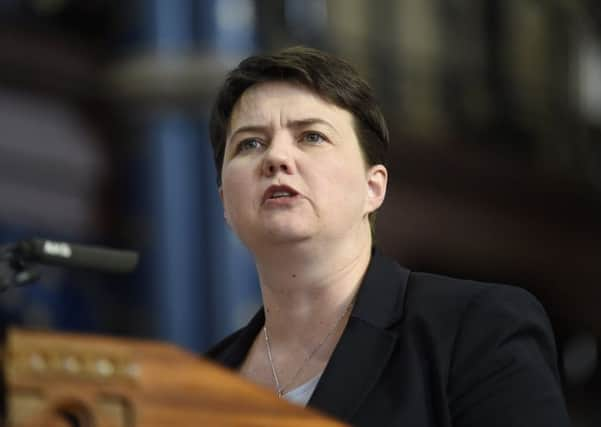Why Ruth Davidson will be watching Scottish Labour conference – Paris Gourtsoyannis


There will be one interested party tuning in for the first time – but unfortunately for Labour, they won’t be in the room filling seats. Scottish Conservatives will be paying close attention, not for entertainment value, but because the mood of the Labour Party matters to their own ambitions.
We’re closer to the next Scottish election than the last one, and when Ruth Davidson literally steps back onto the stage at her own party conference in May, she will kick off the Tories’ long campaign to win power at Holyrood for the first time.
Advertisement
Hide AdAdvertisement
Hide AdConservatives hope her return from maternity leave will give the party a boost. Twin constitutional arguments over Brexit and independence have made the SNP remarkably resilient in the polls despite a struggling domestic record. Davidson’s party has been left in a distant and largely inert second place, unable to appeal to much more than a quarter of the electorate.
Under Richard Leonard, meanwhile, Labour have slid backwards. Riding on Jeremy Corbyn’s coattails and fractured by Brexit and the controversy over its response to antisemitism among its supporters, Labour appears unable to even challenge for second.
The next Scottish election is destined to be defined by the constitution. Nicola Sturgeon is set to demand the power for a second independence referendum, without any intention of actually holding one, and she only has to draw out the row over whether Holyrood or Westminster has the power to grant it until 2021.
In fact, many in the SNP believe the next Scottish election will come sooner than that – including the First Minister, who warned her MPs to prepare for a snap vote as wrangling with the Greens over a budget deal dragged on until the final hours. SNP insiders tell of party staff spending the weekend before the stage-one budget vote stuffing leaflets into envelopes in case things didn’t go to plan. Another deal will have to be struck next year, and it won’t be any easier.
In an election about who gets to call a referendum, Davidson will need to draw Unionist votes to her if she has a hope of preventing a pro-independence majority in the new parliament. But the Tories will also have to put together a manifesto that makes it possible for Labour to first back Davidson as First Minister and then, crucially, pass budgets of her own.
Before the last Scottish election, Davidson broke with Tory orthodoxy to embrace free prescription charges. Party policy is under review, and having abandoned opposition to universality for one government giveaway, there’s no reason Davidson can’t do it again. A handful of her colleagues are already calling for a much bigger u-turn, arguing that the Tories need to back the SNP shibboleth of free university tuition. That isn’t a debate they’re likely to win outright. But a change to their 2016 policy of reintroducing a graduate contribution – for instance, applying a stepped charge progressively as earnings increase over a 30-year period, as modelled in research for the MillionPlus group of universities – could make it easier to accept, if it was coupled with a more generous grant scheme for living costs.
However Davidson chooses to win over new Tory voters, it’s clear she’ll need to do it by setting herself apart from the UK-wide Conservative agenda – particularly if it’s being set by someone like Sajid Javid. Labour-led administrations in Edinburgh faced the same challenge, and thrived when they were seen to be at odds with head office in London. Downing Street is already being warned that relations with a Davidson-led minority Conservative administration might not improve all that much, at least in public.
It’s unhappy Labour supporters in Dundee that the Scottish Tories need to find common ground with. They should be listening closely.